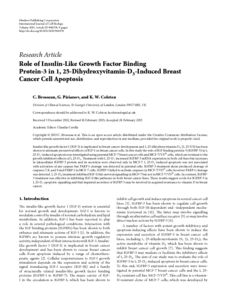Brosseau, C; Pirianov, G; Colston, KW
(2013)
Role of insulin-like growth factor binding protein-3 in 1, 25-dihydroxyvitamin-d 3 -induced breast cancer cell apoptosis.
International Journal of Cell Biology, 2013 (960378).
ISSN 1687-8876
https://doi.org/10.1155/2013/960378
SGUL Authors: Pirianov, Grisha
![[img]](https://openaccess.sgul.ac.uk/101154/1.hassmallThumbnailVersion/IJCB2013-960378.pdf)  Preview |
|
["document_typename_application/pdf; charset=binary" not defined]
Published Version
Download (1MB)
| Preview
|
Abstract
Insulin-like growth factor I (IGF-I) is implicated in breast cancer development and 1, 25-dihydroxyvitamin D3 (1, 25-D3) has been shown to attenuate prosurvival effects of IGF-I on breast cancer cells. In this study the role of IGF binding protein-3 (IGFBP-3) in 1, 25-D3-induced apoptosis was investigated using parental MCF-7 breast cancer cells and MCF-7/VD(R) cells, which are resistant to the growth inhibitory effects of 1, 25-D3. Treatment with 1, 25-D3 increased IGFBP-3 mRNA expression in both cell lines but increases in intracellular IGFBP-3 protein and its secretion were observed only in MCF-7. 1, 25-D3-induced apoptosis was not associated with activation of any caspase but PARP-1 cleavage was detected in parental cells. IGFBP-3 treatment alone produced cleavage of caspases 7, 8, and 9 and PARP-1 in MCF-7 cells. IGFBP-3 failed to activate caspases in MCF-7/VD(R) cells; however PARP-1 cleavage was detected. 1, 25-D3 treatment inhibited IGF-I/Akt survival signalling in MCF-7 but not in MCF-7/VD(R) cells. In contrast, IGFBP-3 treatment was effective in inhibiting IGF-I/Akt pathways in both breast cancer lines. These results suggest a role for IGFBP-3 in 1, 25-D3 apoptotic signalling and that impaired secretion of IGFBP-3 may be involved in acquired resistance to vitamin D in breast cancer.
Statistics
Item downloaded times since 05 Jul 2013.
Actions (login required)
 |
Edit Item |




